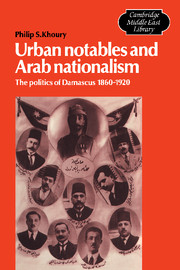Book contents
- Frontmatter
- Contents
- List of maps
- Note on transcription
- Preface
- Introduction
- 1 The political configuration of Damascus in 1860
- 2 The consolidation of leadership in Damascus after 1860
- 3 Damascus notables and the rise of Arab nationalism before World War I
- 4 Notables, nationalists and Faysal's Arab government in Damascus, 1918–20
- Conclusion
- Notes
- Bibliography
- Glossary of Arabic, Persian and Turkish terms
- Index
2 - The consolidation of leadership in Damascus after 1860
Published online by Cambridge University Press: 14 October 2009
- Frontmatter
- Contents
- List of maps
- Note on transcription
- Preface
- Introduction
- 1 The political configuration of Damascus in 1860
- 2 The consolidation of leadership in Damascus after 1860
- 3 Damascus notables and the rise of Arab nationalism before World War I
- 4 Notables, nationalists and Faysal's Arab government in Damascus, 1918–20
- Conclusion
- Notes
- Bibliography
- Glossary of Arabic, Persian and Turkish terms
- Index
Summary
The immediate political impact of the 1860 disturbances was a weakened traditional leadership in Damascus. During the next forty years two new developments–the spread of private landownership and the growth of the state in the life of the town and province–stimulated the recomposition and integration of urban political forces. By the turn of the twentieth century a reconstituted political élite had emerged in Damascus, the product of a recently consolidated, fairly well integrated and socially cohesive landed upper class, which had aligned itself more closely with Istanbul.
The development of private landownership
During the first half of the nineteenth century the Syrian economy began to feel the impact of commercialization. Dislocations in the urban economy caused by the competition of European manufactured goods, coupled with the spread of cash cropping, helped to stimulate land acquisition.
In the Biqa‘ Valley and the Ghuta, members of the religious establishment and a group of secular dignitaries, who were center-city merchants and tax farmers, controlled the land system. Some had used their posts on the majlis to extend their holdings by auctioning tax farms to themselves and their families. There also emerged another group of merchant-moneylenders–recently enriched by the forces of commercialization–who acquired lands through the manipulation of usurious capital in these areas and in the Hawran grain belt. Aghawat in the peripheral quarters of the city or lesser dignitaries from the center city, these merchant-moneylenders came to dominate the Hawran and joined the more socially prominent notable tax farmers in the Biqa‘ and the Ghuta.
- Type
- Chapter
- Information
- Urban Notables and Arab NationalismThe Politics of Damascus 1860–1920, pp. 26 - 52Publisher: Cambridge University PressPrint publication year: 1983
- 1
- Cited by



